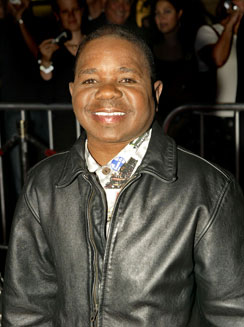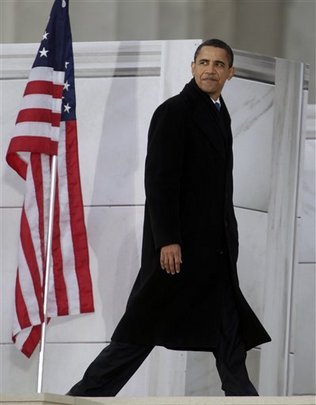On Wednesday night, Sam Tanenhaus and I talked. I was in the middle of arguing with my colleague Levi Asher about the future of literary coverage, saying something to him about a priori arguments in relation to rumors about The Washington Post Book World. A soft voice behind us asked, “Book World?” It was Tanenhaus.
I must give Tanenhaus credit. It was a particularly freezing evening and Tanenhaus clearly wanted to go home. But he did take the time out to chit-chat.
Our discussion was fiery but civil. I had blunt words to say to him about the New York Times Book Review‘s paucity of translated fiction coverage and its poor attention to genre — particularly science fiction. (I suggested a replacement name for Dave Itzkoff when he asked.) He had blunt words to say to me about the harsh language directed his way on this blog — and there has been, much to my present shock, quite a lot of posts devoted to Tanenhaus. But any man who can tell me to my face that he doesn’t care for my work, without a cowardly online pseudonym or an entirely batshit perspective, can’t be all bad. And I certainly took no offense to anything he said.
I had approached Tanenhaus earlier in the evening, just after he had concluded a talk at Barnes & Noble. I came to him pointing out that I merely had one question, that there would be no ambush journalism on my part, and that I simply hoped he could clarify the record. Why had seven of the top ten books of 2008 been granted to Knopf? He did not know who I was initially. It could have been the beard. And while he grew visibly agitated when I told him I was Ed Champion, he did stick around a bit to answer my question.
He indicated to me that the books selection process was publisher-blind and suggested that “the readers don’t really care.” (He seemed to be insinuating that the NYTBR only cared about the “common reader.”) In a scenario in which one conglomerate dominated the top ten monopoly (in 2008, nine of the ten titles had gone to Random House), Tanenhaus was strongly against the idea of offering a level playing field in which a few titles from another publisher might fill in some of the slots. “We can’t really say to ourselves which one doesn’t fit,” said Tanenhaus. Although he did insinuate that “seven Graywolfs” would also be great, if the selection process had veered down that direction.
But what of a hypothetical alternative list that involved splitting up the top ten books among multiple publishers? Or one that considered genre? This was, in Tanenhaus’s perspective, reflective of “commerce at the center.”
I then pointed out to Tanenhaus that commerce was perhaps more “at the center” when the NYTBR placed 90% of its top ten list with one conglomerate, and noted that other newspapers had different criteria in place to present such a scenario from happening. Tanenhaus tsk-tsked this, before another guy, who looked to be either a friend or a colleague, came to rescue Tanenhaus and extract him from my inquiries.
I returned to my amigos, and we began shooting the shit about all this. I believe Eric was the first to point the predictability of Tanenhaus’s answers. But one had to try. Tanenhaus then came rushing by, looking for his coat. I then introduced Tanenhaus to Levi, notably responsible for the excellent “Reviewing the Review” weekly series. I asked Tanenhaus if he had found any of Levi’s observations helpful. He said no.
And so we left to grab drinks. I had joked that Tanenhaus’s inflexibility to other perspectives made him the “George W. Bush of the literary world” and suggested that perhaps the NYTBR “needed an Obama” to restore coverage back to the heights of John Leonard. The group then suggested that I was that Obama, and I responded that they couldn’t possibly be serious.
As it turned out, my Bush comparison was also wrong. For Tanenhaus did talk with us about twenty minutes later. He did express some regret that he hadn’t given enough space to translated titles, but he had no answers as to how or when he would do this in the future. The sense I got was that Tanenhaus was completely reliant on his editors’ respective judgments and that this judgment permitted him to do what he needed to do in an executive capacity, but prevented him from plunging first-hand into some of today’s realities. Levi brought up the rather unfunny offerings to be found in The Back Page. And Tanenhaus suggested to us that we should send him ideas on how to improve it. The Back Page was largely freelance.
Ideas? Freelance? I know damn well that there’s no way in hell that I will ever write for The New York Times Book Review, but I decided to present a mock hypothetical. What if I were to pitch him ideas? He suggested that my journalism was “irresponsible” and “defamatory.” I asked him when he had last read my blog, and he indicated it had been many years. Well, how could he be certain that everything I was writing was “irresponsible” and “defamatory?” Another editor had told him. I mentioned the 1,600 word response to Adam Sternbergh’s review of David Denby’s Snark.
Tanenhaus was stunned to learn that I had been published in other newspapers. There was a tinge of fury flushing through his face upon hearing this news, but Tanenhaus did keep things civilized. He insisted that my “defamations” were not up to the New York Times‘s “standards.” I had the feeling he had been wanting to say much of this for some time and, given that I had zinged him here multiple times, it seemed only fair to shut up and let him deliver his apparent vitriol. I pointed out that I went after all targets, and Levi and I both observed that these posts were largely satirical. Levi defended me and compared my work to Paul Krassner. A kind and humbling comparison, but I doubted that Tanenhaus had much appreciation for a yippy.
“Ad hominem” was the key term on Tanenhaus’s mind. And I pointed out that Leon Wieseltier’s review of Nicholson Baker’s Checkpoint was just as ad hominem as anything I had ever written in calling Baker’s novel “a scummy little book.” Ah, Tanenhaus responded, but Wieseltier was attacking the book, not the person. (I probably should have said to Tanenhaus that the definition of ad hominem involves attacking the object of the argument instead of making an effort to discredit it. Wieseltier calling Baker’s novel “a scummy little book” is just as low and pointless, a missed opportunity to explain to the reader why it doesn’t hold up as a novel.) This was where Tanenhaus remained stubborn. I had pointed out that Wieseltier’s aside about liberals vs. conservatives had very little to do with the quality of the book. Tanenhaus flatly declared that it was a tight argument.
“You don’t have to like what I do. I don’t have to like what you do,” said Tanenhaus. Fair enough. But this seemed absurd. Couldn’t we agree on a few common points?
He was particularly fixated on my “The Knopf Times Book Review” post, in which I had proposed that The New York Times Book Review had been bought and paid for by Knopf. But the words I wrote, while quite blistering, were satirical in the end. And beneath the vituperation was the telltale entreaty to Tanenhaus that he should exercise more judgment in his selection process if anyone wanted to take the New York Times Book Review seriously, with Dwight Garner’s recent work as daily book reviewer held up as a more virtuous model. (Not unlike Tanenhaus’s entreaty to me that I should stop tossing around ad hominem bombs. But Tanenhaus has admired Tom Wolfe and Joe Queenan, both writers who specialize in ad hominem. There were, of course, double standards on this question.)
In the end, I’m glad that Tanenhaus and I finally got to chat a bit. No, we’re not going to be BFF anytime soon. And I will continue to criticize the NYTBR‘s inadequacies, particularly when Tanenhaus and his team continue to perform grave injustices to covering translated fiction, debut fiction, graphic novels, and genre. But we were able to come together and have a civil disagreement and an exchange of views, and clear up a few points. That, in the end, is a healthy and constructive form of communication.
[UPDATE: Levi Asher has posted his report of the events.]

 Even though I have yet to hear back from Marcus Brauchli
Even though I have yet to hear back from Marcus Brauchli 
 Today is the beginning of a new epoch. The slate is clean, the road ahead is paved with shrapnel, and the body language between the Obamas and the Bushes just before their preinaugural coffee is wonderfully comical. While I retain my hearty skepticism about politics, I can say, without reservation, that I am very proud to be an American right now. The last eight years nearly destroyed my faith in government, transformed me into something of a fiery curmudgeon in matters pertaining to politics, and made me wonder if we could ever set this country straight. But this morning, upon seeing Obama walk into the White House, there was one overwhelming and seemingly inconceivable thought: My god, this man will be our President.
Today is the beginning of a new epoch. The slate is clean, the road ahead is paved with shrapnel, and the body language between the Obamas and the Bushes just before their preinaugural coffee is wonderfully comical. While I retain my hearty skepticism about politics, I can say, without reservation, that I am very proud to be an American right now. The last eight years nearly destroyed my faith in government, transformed me into something of a fiery curmudgeon in matters pertaining to politics, and made me wonder if we could ever set this country straight. But this morning, upon seeing Obama walk into the White House, there was one overwhelming and seemingly inconceivable thought: My god, this man will be our President.